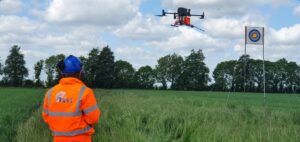Drones are being used to spray pesticides for the first time in Great Britain in a trial of new technology.
The Health and Safety Executive (HSE) approved the trial that allows plants and weeds growing around railway infrastructure to be treated by pesticides applied by drones.
The technology was discussed at an international conference organised by HSE. The regulator leads a global partnership looking at how drones could be used to apply pesticides in the future.
The railway trial allows chemical herbicides to be sprayed on railway bridges, tunnel portals and viaducts. The technology could potentially be used in other industries.

Professor Andrew Curran, HSE’s chief scientific adviser, said: “Although we need to carefully consider both the environmental implications and potential consequences for human health, the emerging evidence suggests using drones to spray pesticides could have can have a positive impact on safety and the environment. If applied in the right way drones could spray more safely and more economically. This could have big implications for other industries especially agriculture.”
HSE plays a prominent role in an initiative designed to help regulators around the world assess the risks associated with applying pesticides by drone.
Applying Pesticides Using Drones took place in York between 23 and 24 May and was sponsored by the OECD Co-operative Research Programme: Sustainable Agricultural and Food Systems.

Attendees heard from internationally recognised regulators, researchers and industry experts from North America, Asia, Europe, and Australia.
“We believe we have a key role in driving international developments which can help improve safety and protect people, places and the environment around the globe,” said Professor Curran.
In the trial, drones developed by commercial firm Railscape Ltd have been used to control plants and weeds growing around railway infrastructure. This is normally done by workers manually, who often must work at height, overnight and on a tight time schedule when trains aren’t operating. It is hoped using drones will reduce the risk of injury to workers and make the application more efficient and effective.
Ed Lewis, operations and project manager at Railscape, said the drone had been designed to spray pesticides in areas that are difficult or hazardous to reach using conventional working at height methods.
“While it was designed to operate in the railway environment, there are wider opportunities for other applications in equally challenging environments,” he added.
“The Railscape solution is a UK first and we are currently the only company offering this service.”
About HSE
The Health and Safety Executive (HSE) is Britain’s national regulator for workplace health and safety. We prevent work-related death, injury and ill health through regulatory actions that range from influencing behaviours across whole industry sectors through to targeted interventions on individual businesses. These activities are supported by globally recognised scientific expertise. hse.gov.uk
Follow this news feed: HSE





